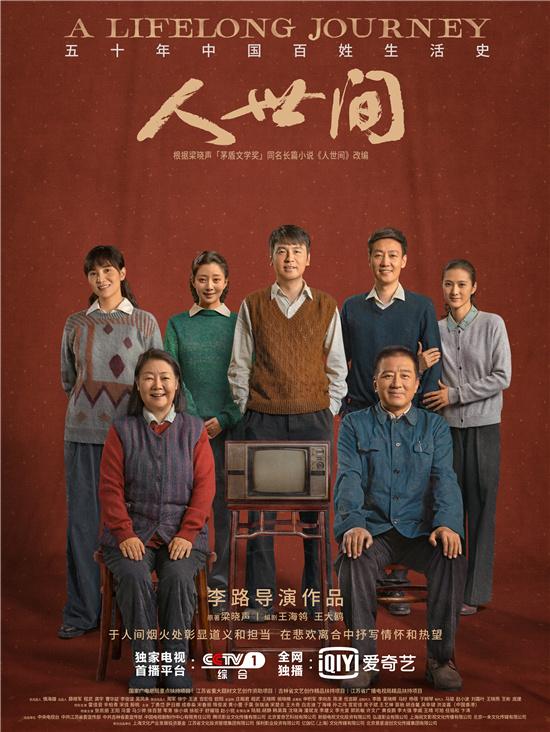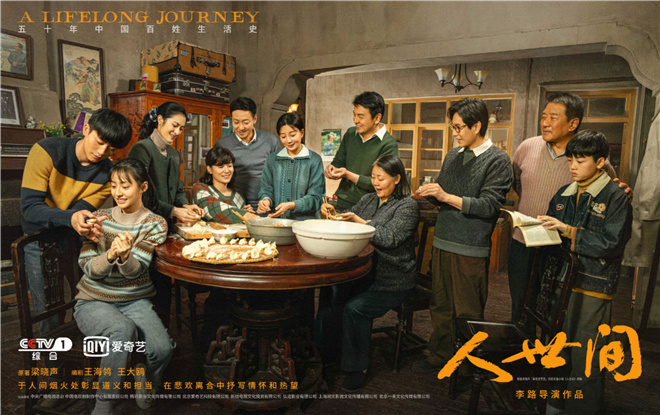The hit era of "In the World" needs an age drama with temperature and depth.
Original title: The era needs a drama with temperature and depth

In recent years, domestic TV dramas seem to have entered a "small era", 10-mdash; About 30 episodes of short and medium-length TV series are very popular, and many long TV series also adopt series and unit dramas to meet the audience’s demand for "short, flat and fast" drama pursuit. Taking stock of last year’s TV dramas with good ratings and good reputation, except for The Awakeing Age’s long space, others such as Minning Town’s Meritorious Works and Big Rivers 2 are all within 40 episodes. On the eve of the Spring Festival this year, a 58-episode long TV series was broadcast simultaneously with iQiyi on CCTV 1, which gained great attention and has been ranked first in ratings and market share since its launch. This is the age drama "In the World" directed by Li Lu, written by Wang Hailing and Wang Daou, and starring,,, and.
The popularity of "In the World" shows that it is not that today’s audience doesn’t like watching long dramas and big dramas, but that there is a lack of excellent long dramas and big dramas at present. Just as novels and feature films are the main indicators to measure a country’s literary and film creation level, the quantity and quality of long TV dramas are also an important criterion to test whether a country’s TV dramas are developed. In 1958, China’s first TV series "A Bite of Cake" was born. It was a single drama with a duration of only 20 minutes, and no video materials were left. Therefore, the first TV series in China in the true sense was the 9-episode series "Eighteen Years of Enemy Camp" which came out in 1981. By 1985, four generations under one roof (28 episodes), the length of China’s TV series had increased significantly, while in 1990, Desire (50 episodes) created a precedent for China’s long TV series, and with an amazing audience rating of 90.78%, it created the spectacle of "People watch Desire in an empty lane and the whole country talks about Liu Huifang", which became a milestone in the history of China’s TV series development.
In the past 30 years, China’s TV production has grown rapidly and has become the largest TV production country in the world. Quality is often based on quantity. A number of excellent works have emerged in a large number of TV dramas, and those classic works that are well-known to women and children and are repeatedly watched by the audience are often long TV series, such as Romance of the Three Kingdoms (84 episodes, 1994), Water Margin (43 episodes, 1998) and Yongzheng Dynasty. 2001) Towards the Republic (59 episodes, 2003), Hanwu the Great (58 episodes, 2005), Qiao Family Courtyard (45 episodes, 2006), Ming Dynasty 1566 (46 episodes, 2007), Golden Wedding (50 episodes, 2007) and Breaking. 2015) Ordinary World (56 episodes, 2015), in the name of people (52 episodes, 2017), Bailuyuan (77 episodes, 2017), Dajiang River (47 episodes, 2018), The Awakeing Age (43 episodes, 2021), etc. (The above does not include long TV series. There is no unified standard for the division of short, medium-length and long-length TV dramas. According to the overall situation of TV dramas in China,Set 40 episodes as the lower limit of a long TV series. As can be seen from the above incomplete list, the long TV series represents the level of TV drama creation in China to a great extent.
In recent years, under the influence of many factors, "fast food culture" has become a fashion of mass cultural consumption. Reading famous books only in condensed versions, watching mobile phones only in short videos, and learning knowledge only in crash courses, many people gradually stay away from things with considerable length and depth that take time and cost and need to calm down and feel and comprehend. In this context, it is not surprising that the length of TV series is getting shorter and shorter. There is no denying that "short, flat and fast" does have its advantages, but if everyone rushes to pursue "short, flat and fast", there will be problems. Imagine if our classical novels only have "three words and two beats" without Four Great Classical Novels, and if today’s video works only have short videos and micro movies without big movies, what would it be like? Of course, we don’t have to reject the art of "short, flat and fast", but at the same time we also need the art of "long and slow". At the moment when short and medium-length TV dramas are popular, we call on TV drama workers to pay more attention to the creation of long TV dramas.
In the creation of long TV plays, the creation of chronological plays is particularly noteworthy. "Chronological drama" was not originally a kind of TV series, but it has been widely accepted in recent years, so this paper adopts this concept. Up to now, there is no clear definition of chronological drama. The author defines it as a TV series with family as the narrative center, which reflects the daily life and social changes of ordinary people in a long period since the late Qing Dynasty. In the time dimension, chronological drama is different from historical drama; In terms of theme content, the drama of the era is different from the drama of major revolutionary history and reality; In terms of the length of the plot, chronological drama is different from other short-term modern and contemporary family dramas and social dramas. This attribute of chronological drama makes it difficult to present it through drama, film and other artistic forms, thus becoming a good field of TV drama art. Compared with other types of TV dramas, chronological dramas show a wider range of social life and are closer to the lives of ordinary people, so they are widely welcomed by audiences of all ages. The genre characteristics of chronological dramas determine that they are more suitable for shooting long TV series, so the most familiar chronological dramas are generally some chronological dramas, such as Longing, Dazhaimen, Qiao Family Courtyard, Golden Wedding, Crossing the Kanto, Parents’ Love, Ordinary World and Bailuyuan.

In the last three or four years, no matter in TV dramas or online dramas, it’s hard to find a drama of the era with such a heavy feeling and wide influence as the above works. In this context, the emergence of "In the World" has an extraordinary significance. This TV series adapted from Liang Xiaosheng’s novel of the same name, which won the Mao Dun Literature Prize, is centered on a family named Zhou in Guangzi District, Jichun City, the capital of Jiangliao Province in Northeast China. Around the love, marriage, family and career of Zhou’s three brothers and sisters, it describes the living conditions of ordinary citizens and the evolution of China society for nearly half a century from the end of the 1960s to 2016. It can be called "showing morality and responsibility in the fireworks on earth and expressing feelings and aspirations in the joys and sorrows".
Judging from the series that have been broadcast, In the World can be regarded as a rare high-quality drama in recent years. With simple realism, in the slow rhythm of narration, the play truly presents the trivial daily life, describes the love and affection of family members in detail, vividly depicts the group images of people with different personalities, profoundly shows the human world in social change, and vividly presents a picture scroll of the times with great tolerance and depth to the audience. For the low-level little people represented by Zhou Bingkun and Zheng Juan, the author poured deeper feelings, their enthusiasm and kindness, their selflessness and thoughtfulness, their grievances and forbearance, their fragility and helplessness, their optimism and open-mindedness, and their tenacity and persistence, which fully reflected the living situation, thoughts and feelings of the small people in the great era and the excellent moral character accumulated by the Chinese nation for thousands of years. From them, we feel the heat of life and realize the beauty of human nature. At the same time, the fate of these little people reflects the turbulent situation of the great era. In the process of recalling the common memory of several generations, let us raise the life history of the people to the dimension of national history to observe and think, so as to achieve individual identity confirmation and collective cognition of ethnic groups on a newer level.
Excellent chronological dramas put the trivial personal and family narratives full of fireworks in the grand national historical context, so they often have richer social, political, historical, cultural and ethical connotations than other types of TV dramas, which not only have high aesthetic value, but also have important cognitive and educational significance, and play an irreplaceable and unique role in the whole literary ecology and spiritual civilization construction. Today, when high-quality chronological dramas are scarce, we should praise the elaborate work "In the World", and hope that more chronological dramas with emotional temperature and ideological depth can appear on the screen. (Author: Tian Guang, Associate Professor, Institute of Drama, Film and Television Literature, College of Literature, Lanzhou University)